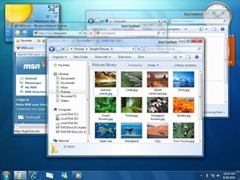Google is releasing a lightweight, open-source PC-operating system later this year, the company announced Tuesday night, a move that threatens the very heart of Microsoft, long seen as Google’s biggest rival.
Chrome OS is intended to be a very lightweight, quick-starting operating system whose central focus is supporting Google’s Chrome browser. Applications will run mostly inside the browser, making the web — not the desktop — into the computer’s default operating system.
It’s a sign that Google truly believes in the age of cloud computing — where the usefulness of a computer is in its connection to the net where data is stored remotely and information processing happens in a dance between a browser and remote servers.
The Linux-based OS is the second for Google, following on Android, another open-source OS that intended for small devices such as mobile phones. Chrome OS will first be on netbooks — the popular lightweight and inexpensive notebook computers — in the second half of 2010, the company said in a blog post. Desktops will come later.
The code itself will be released under an unspecified open-source license at the end of the year.
The announcement included some not so veiled jabs at Microsoft.
People want to get to their email instantly, without wasting time waiting for their computers to boot and browsers to start up. They want their computers to always run as fast as when they first bought them. [...] Even more importantly, they don’t want to spend hours configuring their computers to work with every new piece of hardware, or have to worry about constant software updates.
Google has already laid the ground work for a web OS by revolutionizing webmail with Gmail’s speed, features and capacity (now over 7GB). It followed that with free online word processing and spreadsheet software. Add in its online photo sharing services, and the myriad other online applications from Facebook to customized radio station Pandora, and most common uses of a computer can be done through a browser.
With Tuesday’s announcement, Google is going after Microsoft’s most lucrative and dominant business — the operating system.
Google is implicitly making the argument that there’s no need to pay the premium for a Microsoft OS, when there is lighter, faster and free. And Google is arguing, rather persuasively, that the Web and modern, standards-based browsers like Chrome, Safari, Opera and Firefox are where innovative third-party development is taking place these days.
Speed, simplicity and security are the key aspects of Google Chrome OS. We’re designing the OS to be fast and lightweight, to start up and get you onto the web in a few seconds. The user interface is minimal to stay out of your way, and most of the user experience takes place on the web. And as we did for the Google Chrome browser, we are going back to the basics and completely redesigning the underlying security architecture of the OS so that users don’t have to deal with viruses, malware and security updates. It should just work.
More to the point, more web usage equals more money for Google, which basically makes more money the more people use the web — thanks to its dominant ad platform that brought in more than $5 billion in revenue in the first three months of 2009.
Microsoft has been looking forward to the fall release of Windows 7, its successor to the not-well received Vista. Windows 7 beta releases have gotten good reviews. It’s a bit more complicated in the enterprise space, where IT departments are slow to migrate to anything, but for the average consumer the question now becomes, why ever pay again for a Microsoft operating system, unless you are a gamer or run custom, legacy software?
If indeed Google puts out a fast, easy to use operating system that lets netbooks soar and free users from constant software patches, Microsoft will find it very hard to explain to consumers why they should continue to use its software, other than just out of a foolish consistency.
Don’t be evil, Google’s unofficial motto, has long been understood as code for “Don’t be Microsoft.” Perhaps, it ought now it to be augmented with the commandment, “Leave no Microsoft product unchallenged.
from Wired …
Njoy ..




